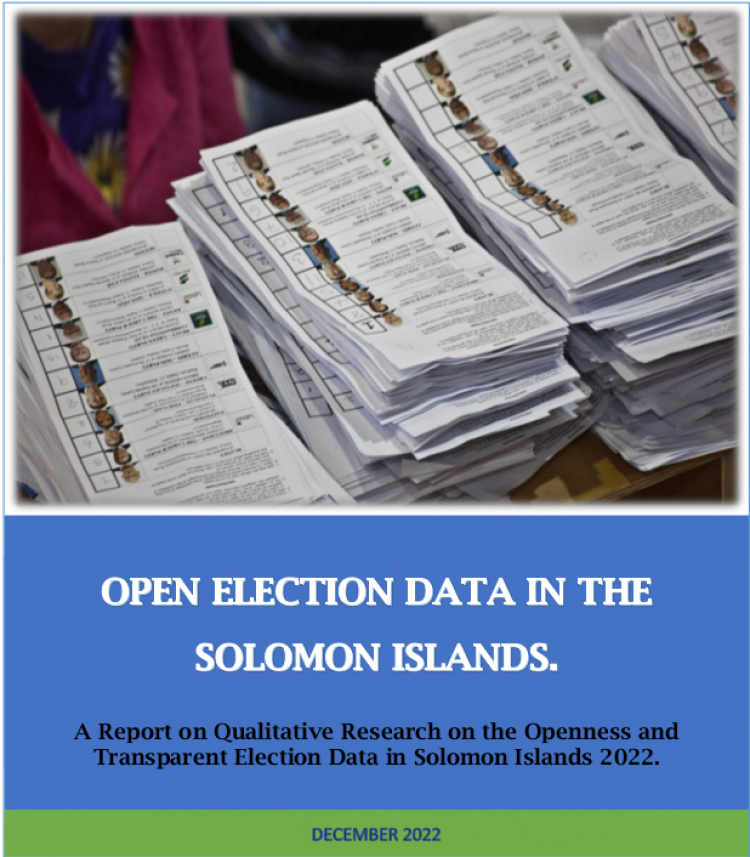Promoting Election Integrity Through Open and Transparent Data in the Solomon Islands
Twenty years after an internal violent conflict between militants from different ethnic groups—known as 'the tensions'—delivering national elections in the Solomon Islands remains challenging due to intertwined social, cultural, and political factors. The country’s cultural and geographic diversity means that many citizens live in remote areas, outside the reach of government services or public awareness campaigns. This leads to a knowledge gap when it comes to political, legal and civil rights, electoral processes, as well as the functioning of democratic systems more broadly.
At the same time, the members of parliament benefit from one of the largest discretionary funds in the world—the Constituency Development Fund—an aspect that makes parliamentary elections play a quintessential role in the politics and the development of the country. To increase their support base in order to gain political advantages, some candidates use a legal loophole, the so-called “out-of-constituency registration” provision, which allows voters to register to vote in other constituencies than the one they reside in, without having to travel to them.
Honiara - For TSI page.jpg

With the recent extension of the Solomon Islands Parliament term from four to five years, the national general election is now slated for 2024. With financial support from the United States Agency for International Development and technical assistance from the National Democratic Institute, from February to September 2022, TSI assessed the integrity of data in key categories in an election process against minimum standards of transparency derived from Open Government Partnership (OGP) principles. These categories included, among others, the legal framework on elections, election administration, election campaign and finance, voter registration, a variety of election day procedures and election results.
TSI found that election data is not open in most researched areas, thus a majority of the citizens who are eligible to vote in elections are not fully aware of the key information surrounding elections, the election system, the voting process, roles and responsibilities of members of parliament and most importantly, they don’t understand how democracy should deliver in the context of their everyday lives. “We acknowledge the opportunity to be able to promote election integrity through demanding that more practical and useful data about the political process be made available to citizens, as well as to provide policy recommendations to responsible institutions and relevant stakeholders,” explained Ms. Patricia Kolaoi, Project Coordinator.
Some key information was available online on relevant election stakeholder websites, in particular, the site of the electoral management body, but it was outdated. Additionally, the availability of electoral staff members to respond to requests for information during the data collection period was limited, thus affecting the quantity and quality of data gathered for this project. Finally, the project team observed that, overall, there was limited access to election-related education materials for the public, as well as a lack of proper training of electoral officials. Underfunding of elections led polling teams to use inappropriate infrastructure, especially in remote areas, where voters and polling materials remain exposed to weather events. TSI’s project was implemented during the COVID-19 pandemic, which added a new layer of challenges to the ongoing constraints of limited staffing and capacity of key institutions.
To improve the quality of the election and ultimately its legitimacy, TSI recommends addressing the quality of education for both voters and candidates, through proper training and recruitment of electoral officials; improving the infrastructure of and access to polling places to keep voters and sensitive materials safe; and improving access to technology, while ensuring that the skills to use it effectively are in place as well. All these aspects will need funding, strong support, and close collaboration of the government and other responsible institutions. TSI will continue to promote data openness on the electoral processes in the Solomon Islands and disseminate its policy recommendations to the Solomon Islands government, Solomon Islands Electoral Commission, Political Parties Commission, and relevant stakeholders and development partners to improve the election processes and the practicality and usability of official data related to elections. TSI will also use these findings to promote election integrity through advocacy and awareness programs in remote communities in the Solomon Islands.
TSI’s report Open Election Data in the Solomon Islands, which documents their findings and recommendations, can be downloaded using the link below.
Transparency Solomon Islands (TSI) is the Solomon Islands chapter of Transparency International. Formed in 2003, TSI is a not-for-profit organization committed to fighting corruption and promoting transparency, accountability and good governance in Solomon Islands. TSI focuses on the public, private and civil sectors and works to reduce corruption at the grassroots level.
This program is funded by the United States Agency for International Development through the Consortium for Elections and Political Process Strengthening (CEPPS).
